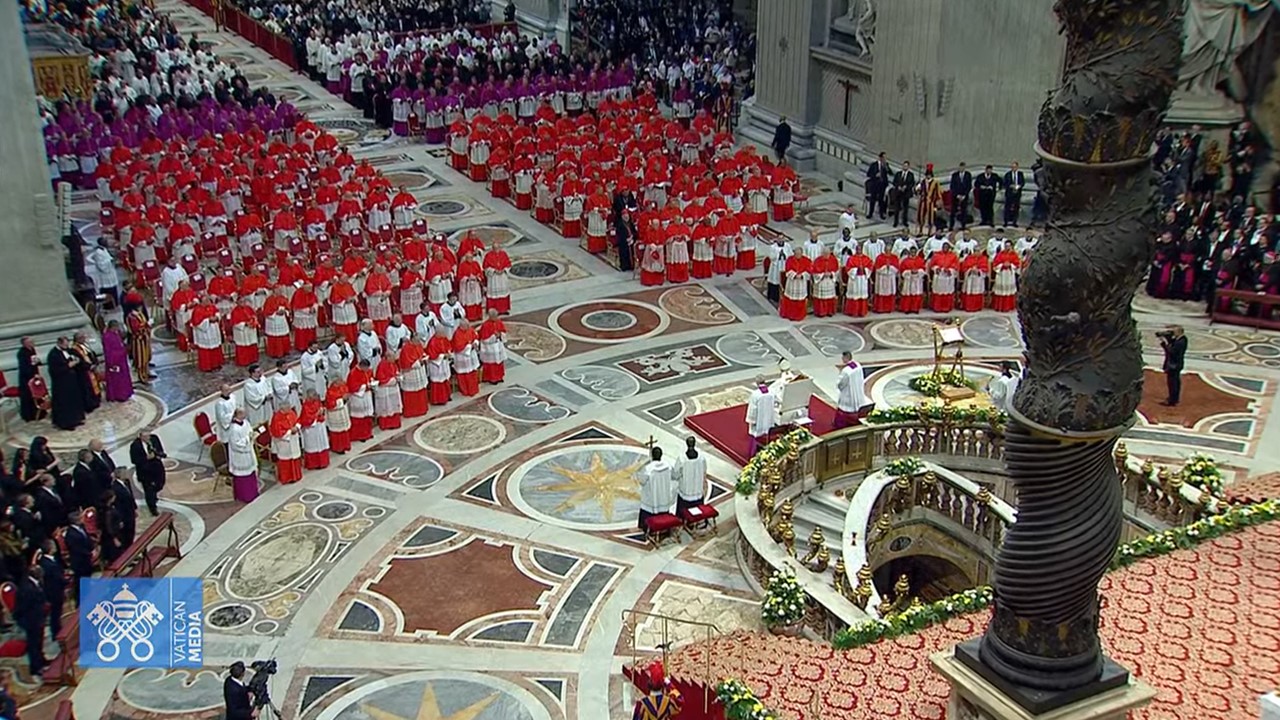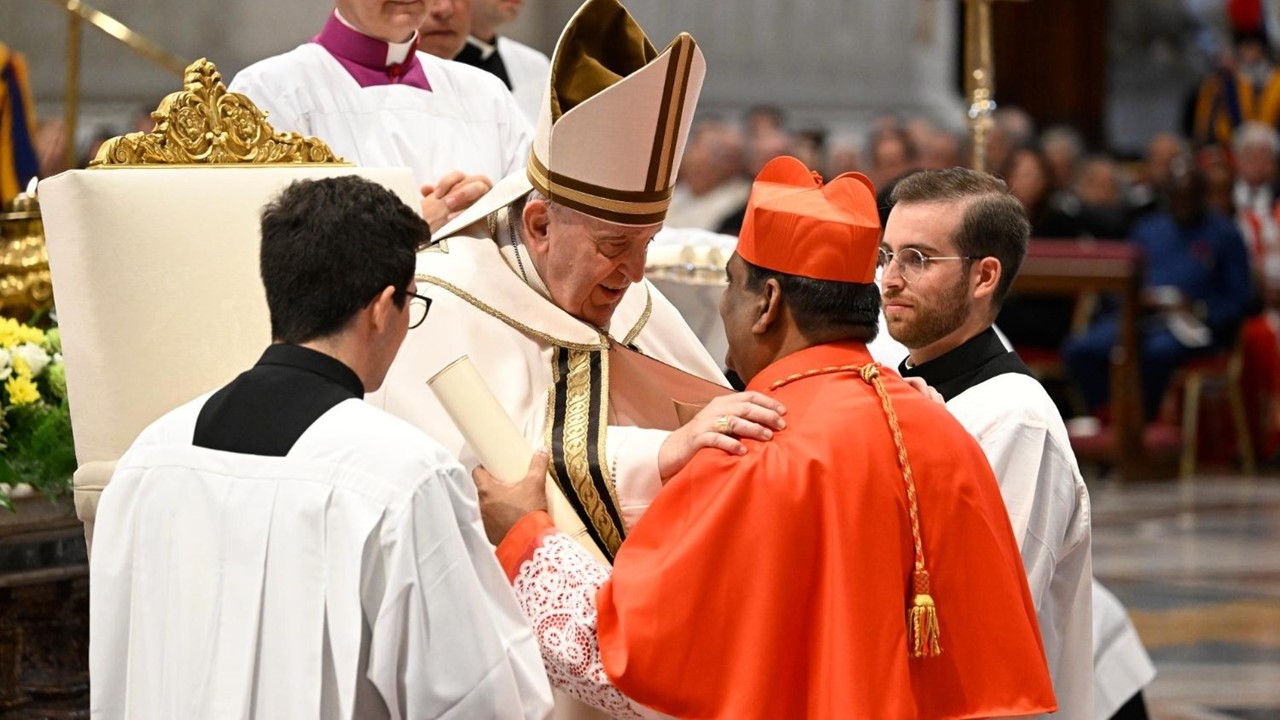Vatican City - Cardinal-designates from five continents received their red biretta (hat) from Pope Francis on Saturday. Members of three religious orders will enter the College of Cardinals, and four new countries will be represented therein: Mongolia, Paraguay, Singapore and East Timor. At the conclusion, the canonization of the founder of the Scalabrinians, Giovanni Battista Scalabrini, and Salesian layman, Artemide Zatti also approved.
Existing and new members of the College of Cardinals from every corner of the globe gathered in Rome on Saturday, 27 August, for Pope Francis' eighth Consistory, where he created 20 new cardinals, 16 of whom are under the age of 80, thus electors in a future Conclave, and four non-electors, over the age of 80.
The celebration marks a universal Consistory, with Church leaders from the five continents. It will also be a "mixed" Consistory with the creation of the 20 new cardinals, who vote shortly afterwards on the causes for canonization of two Blesseds.
Rite of creation of new Cardinals
The rite which took place at 4 p.m. in St. Peter's Basilica began with Pope Francis placing the red biretta on the new Cardinals, giving them their ring, and assigning them their title and rank.

Screengrab from Vatican Media
It began with the singing of "Tu es Petrus" and words of thanksgiving to the Holy Father by the Cardinal first on the list.
One by one they approached the seat of the Pope to receive on their knees the symbols of the cardinalate: red skullcap, biretta, ring, the bull assigning the title and rank. Each received an embrace of peace from Pope Francis, a gesture repeated immediately afterward by the Cardinal Dean, the senior Cardinal Priest and senior Cardinal Deacon, representing the entire College of Cardinals.
Vote on the canonizations
Saturday's rite of creation was followed by the Ordinary Public Consistory for the vote on the canonization of Blesseds Giovanni Battista Scalabrini, Bishop of Piacenza, founder of the Congregation of the Missionaries of St. Charles and the Congregation of the Missionary Sisters of St. Charles Borromeo, better known as the Scalabrinians, and Artemide Zatti, a professed Salesian layman.
Cardinal Marcello Semeraro, Prefect of the Dicastery for the Causes of Saints, read the Peroratio and briefly presents the biographies of the Blesseds. The Pope then gave the outcome of the votes and names the day for the canonizations.
Universality and the peripheries
The names of the new Cardinals were announced by the Pope from the window of the Apostolic Palace during the Angelus on 29 May, along with a request to pray for them "so that, in confirming their fidelity to Christ, they may help me in my ministry as Bishop of Rome for the good of all God's holy faithful people."
The list of names confirmed the twofold criterion seen in the previous seven consistories of Pope Francis. They are internationality, with a special focus on the global south, and attention to the peripheries, that is, the border territories that historically have never had a Cardinal, rather than places traditionally considered "Cardinal-sees."
From all parts of the world
Beyond the first three names of men serving in the Roman Curia, especially given their long tenures, namely the prefects of the Dicasteries of Divine Worship and the Clergy, along with the president of the Governorate, the list of new Cardinals includes those from Europe, six new Cardinals from Asia, two from Africa, one from North America and four from Central and Latin America.

Archbishop Anthony Poola of Hyderabad becomes the sixth Cardinal from India
Four new countries are now represented: Mongolia, Paraguay, Singapore and East Timor. In addition, there are seven religious, including five electors and two non-electors. Three new religious members will enter the College of Cardinals: the Congregation of Jesus & Mary (Eudists), the Consolata Missions Institute and the Legionaries of Christ. The most numerous in the College of Cardinals are the Salesians, numbering ten.
College of Cardinals
As of 27 August, the College of Cardinals now consists of 226 cardinals, including 132 electors and 94 non-electors. 52 cardinals were created by John Paul II of whom 11 are electors; 64 created by Benedict XVI of whom 38 are electors; and 112 created by Francis of whom 83 are electors.
Geographically, they are distributed as follows: 106 in Europe, of whom 54 are electors; 60 in the Americas, of whom 38 are electors; 30 in Asia, of whom 20 are electors; 27 in Africa, of whom 17 are electors; and 5 cardinals in Oceania, of whom 3 are electors.
Names of the new Cardinals
Archbishop Arthur Roche, prefect of the Congregation for Divine Worship; Archbishop Lazarus You Heung-sik, prefect of the Congregation for the Clergy; Archbishop Fernando Vérgez Alzaga, president of the Pontifical Commission for Vatican City State and the Governorate for Vatican City State. Also: Archbishop Jean-Marc Avelin of Marseille; Bishop Peter Ebere Okpaleke of Ekwulobia, Nigeria; Archbishop Leonardo Steiner of Manhaus, Brazil; Archbishop Filipe Neri António Sebastião do Rosário Ferrão of Goa and Damão, India; Bishop Robert W. McElroy of San Diego, USA; Archbishop Virgílio do Carmo da Silva of East Timor; Bishop Oscar Cantoni of Como, Italy; Archbishop Anthony Poola of Hyderabad, India; Archbishop Paulo César Costa of Brasilia; Bishop Richard Kuuia Baawobr of Wa, Ghana; Archbishop William Seng Chye Goh of Singapore; Archbishop Adalberto Martínez Flores of Asunción, Paraguay; and Archbishop Giorgio Marengo, Consolata missionary and Apostolic Prefect of Ulaanbaatar, Mongolia. The latter, at 48, is the youngest member of the College of Cardinals.
Those over the age of 80 whom Pope Francis is elevating to the cardinalate are: Archbishop emeritus Jorge Enrique Jiménez Carvajal of Cartagena (Colombia); Archbishop emeritus Arrigo Miglio of Cagliari, Italy; Fr. Gianfranco Ghirlanda S.J., canonist and former rector of the Pontifical Gregorian University; and Msgr. Fortunato Frezza, canon of St. Peter's Basilica.
-VN